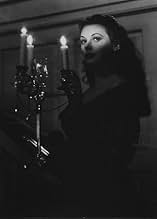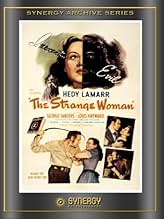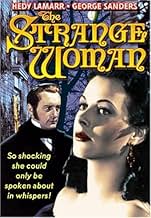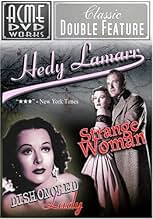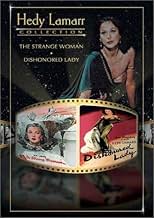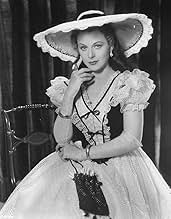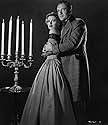IMDb रेटिंग
6.5/10
2.7 हज़ार
आपकी रेटिंग
1820 के दशक में न्यू इंग्लैंड की एक सुंदर लेकिन गरीब और चालाक जेनी हैगर अमीर बूढ़े आदमी ईसैया पोस्टर से शादी करती है लेकिन वो उसके बेटे और उसके कंपनी फोरमैन को भी बहकाती है.1820 के दशक में न्यू इंग्लैंड की एक सुंदर लेकिन गरीब और चालाक जेनी हैगर अमीर बूढ़े आदमी ईसैया पोस्टर से शादी करती है लेकिन वो उसके बेटे और उसके कंपनी फोरमैन को भी बहकाती है.1820 के दशक में न्यू इंग्लैंड की एक सुंदर लेकिन गरीब और चालाक जेनी हैगर अमीर बूढ़े आदमी ईसैया पोस्टर से शादी करती है लेकिन वो उसके बेटे और उसके कंपनी फोरमैन को भी बहकाती है.
Ed Agresti
- Congregation Member
- (बिना क्रेडिट के)
John Alban
- Congregation Member
- (बिना क्रेडिट के)
Fred Aldrich
- Sailor in Saloon
- (बिना क्रेडिट के)
Jessie Arnold
- Mrs. Thatcher
- (बिना क्रेडिट के)
Frank Baker
- Congregation Member
- (बिना क्रेडिट के)
Edward Biby
- Mr. Partridge
- (बिना क्रेडिट के)
फ़ीचर्ड समीक्षाएं
An obscure film which, because of surprising creative touches in directing, acting and editing, should be shown more often: more than a potboiler, more than a "women's picture" that did not happen to star Bette Davis or Joan Crawford, it offers an engaging story, characters of substance and - except for a convenient and contrived ending - an honest portrayal of people caught in a web of circumstances and emotions they cannot control. Aside from the glitter and sweep, it has more similarities to than differences from "Gone With the Wind."
This may be Hedy Lamarr's most challenging role, and she acquits herself quite well. George Sanders appears infrequently as a sympathetic character, but even he is victimized by the Scarlett O'Hara-like wiles of Hedy. That both of these performers have accents that are not suggestive of born-and-bred Maine residents should not constitute more than a minor annoyance. The picture has more than enough offsetting merits.
This may be Hedy Lamarr's most challenging role, and she acquits herself quite well. George Sanders appears infrequently as a sympathetic character, but even he is victimized by the Scarlett O'Hara-like wiles of Hedy. That both of these performers have accents that are not suggestive of born-and-bred Maine residents should not constitute more than a minor annoyance. The picture has more than enough offsetting merits.
Propelled by powerful performances, a good script and strong cinematography, The Strange Woman explores the life of a beautiful, headstrong, passive aggressive femme fatale in Bangor, Maine, during the early 19th century. Hedy Lamar leads an excellent cast and gives it everything she has. Jenny Hager is a deeply troubled woman who grew up in a dysfunctional relationship with an alcoholic father, and married into a rich family. Throughout her life before and after this marriage, she quietly and subtly plotted and schemed to get where, what and who she wanted, while keeping up the appearance of a good, honest country lady.
The film focuses almost exclusively on Jenny and her romantic entanglements, but is also satisfying as a rather odd example of an anachronistic film noir. As such, it is very original in both concept and story. The Strange Woman may be the best piece of directing accomplished by the very prolific B film-maker Edgar Ulmer (Detour). It is nicely shot and paced, and, unlike many noir films, contains a few positive messages in addition to the disturbing stuff.
Recommendation: Serious noir fans will appreciate this, but you have to give this film some time to breathe. It is fairly slow and contains only a few action scenes - which are not its highlights by any stretch. It is also very focused on gender stereotypes (not all of which are treated uncritically), so its appreciation takes a little more thought than the genre standard.
The film focuses almost exclusively on Jenny and her romantic entanglements, but is also satisfying as a rather odd example of an anachronistic film noir. As such, it is very original in both concept and story. The Strange Woman may be the best piece of directing accomplished by the very prolific B film-maker Edgar Ulmer (Detour). It is nicely shot and paced, and, unlike many noir films, contains a few positive messages in addition to the disturbing stuff.
Recommendation: Serious noir fans will appreciate this, but you have to give this film some time to breathe. It is fairly slow and contains only a few action scenes - which are not its highlights by any stretch. It is also very focused on gender stereotypes (not all of which are treated uncritically), so its appreciation takes a little more thought than the genre standard.
An 1820's vixen climbs her way maliciously up the social ladder.
The movie's got the gloss and the casting of a top studio production, maybe TCF. But it's not. Instead, the film is an independent production with Lamarr as a co-producer. I mention this because the result looks tailor-made for a Lamarr career move; at the same time, she does manage to prove she's more than just Hollywood's perfect face. Here, her conniving little vixen (Jenny) transits a number of emotional stages and male victims in fairly convincing style. However, unless I missed something, Jenny's inner guile fails to show up in any of the many close-ups. As a result, Jenny's deceit remains mainly in the script—the one performance flaw.
The movie itself is an atmospheric potboiler, thanks to stylist Edgar Ulmer and art director Remisoff. The scenes may remain stage-bound, but the overall effect is compelling, a triumph of b&w expressiveness. Note too how the scenes get steadily darker as the film progresses and Jenny gets closer to the expected reckoning. Even when the screenplay meanders, which does slow things down, the visuals remain smoothly engaging. Then too, the logging camp setting should have been rethought. The sophisticated Sanders is simply not an outdoor type. Still, wonder of wonders, two of cinema's favorite cerebral baddies, Sanders and Brooke, get sympathetic roles, for a change. Actually, I expected Sanders to break into a cynical sneer at any moment, and maybe Brooke to revert to type with an icy glare. Anyway, it is an interesting cast, down to Hayward as the weakling Ephraim and little Jo Ann Marlowe as the meanest girl since Patty McCormack's Bad Seed (1956).
I don't know if the film resulted in the kind of career break Lamarr was likely looking for, but it remains an entertaining morality tale, despite a spotty script and stage-bound settings.
The movie's got the gloss and the casting of a top studio production, maybe TCF. But it's not. Instead, the film is an independent production with Lamarr as a co-producer. I mention this because the result looks tailor-made for a Lamarr career move; at the same time, she does manage to prove she's more than just Hollywood's perfect face. Here, her conniving little vixen (Jenny) transits a number of emotional stages and male victims in fairly convincing style. However, unless I missed something, Jenny's inner guile fails to show up in any of the many close-ups. As a result, Jenny's deceit remains mainly in the script—the one performance flaw.
The movie itself is an atmospheric potboiler, thanks to stylist Edgar Ulmer and art director Remisoff. The scenes may remain stage-bound, but the overall effect is compelling, a triumph of b&w expressiveness. Note too how the scenes get steadily darker as the film progresses and Jenny gets closer to the expected reckoning. Even when the screenplay meanders, which does slow things down, the visuals remain smoothly engaging. Then too, the logging camp setting should have been rethought. The sophisticated Sanders is simply not an outdoor type. Still, wonder of wonders, two of cinema's favorite cerebral baddies, Sanders and Brooke, get sympathetic roles, for a change. Actually, I expected Sanders to break into a cynical sneer at any moment, and maybe Brooke to revert to type with an icy glare. Anyway, it is an interesting cast, down to Hayward as the weakling Ephraim and little Jo Ann Marlowe as the meanest girl since Patty McCormack's Bad Seed (1956).
I don't know if the film resulted in the kind of career break Lamarr was likely looking for, but it remains an entertaining morality tale, despite a spotty script and stage-bound settings.
What a story and well acted. Hedy as a teenager and then into a grown woman. She was fantastic looking and fantastic in it. I thought George Sanders, whom I admired as an actor was miscast though. Louis Hayward was excellent as the weak son. In fact everyone in it was well cast. Too bad it wasn't in color, or done by a major studio. I could of sworn the little girl that portrays Hedy as a child was also fantastic for her age. She even looked like Hedy may of looked like at that age. Definitely worth watching.
The Strange Woman is directed by Edgar G. Ulmer who also co-writes the screenplay with Hunt Stromberg and Herb Matthews from the novel of the same name written by Ben Ames Williams. It stars Hedy Lamarr, George Sanders, Louis Hayward, Gene Lockhart, Hilary Brooke, Rhys Williams and June Storey. Music is by Carmen Dragon and cinematography by Lucien N. Andriot.
I don't want the youngest. I want the richest!
Well well, what an intriguing little period noir this is. Story deals with Jenny Hagar (Lamarr), a strong and scheming woman who in 1840s Bangor in Maine, uses men for her own gains whilst exuding a double persona that shunts her into the upper echelons of the town's standings. But, as we become privy to Jenny's back story and psychological make-up, you can feel that cloud of pessimism closing in.
There will always be arguments put forward about if the likes of The Strange Woman should be classed as noir or not, but with Ulmer and Andriot cloaking the tale with claustrophobic shadows and low lights, the blacks and whites atmospherically used, thus the visuals are in place to marry up with the story, and what a story.
Jenny Hagar is a classic femme fatale, in fact fatalistic could be her middle name. We get a sneak peak of her deviousness as a child, and then we see her as a luscious older beauty, dangling men around her fingers and fully committed to marrying purely for money. What follows Jenny around is murder, suicide, incest, seduction, greed, violence and alcoholism! And of course, self-destruction.
Jenny has no qualms about who she tramples on to achieve her ends, but the kicker in her story is that she does have good in her fighting to get out, she can be charitable at times, and as we come to understand her upbringing she even garners a level of sympathy from the audience. It's this dual aspect of her make-up that intrigues greatly, but she's fighting a losing battle, more so as Bangor is the wrong place for her, itself a confused mess of unsavoury or spoilt characters.
There were problems behind the scenes, but so many conflicting reports exist it's hard to know what is true and who was pulling the main strings. What we do know is that Ulmer, armed with a bigger budget than usual, has crafted a moody and daring picture that strikes devilish notes without banging the drum too loudly. Striking scenes and imagery are many, thunderstorm seduction, lairy lumberjacks, river of death and the big finale are just some of the moments showing what Ulmer was capable off.
While Lamarr, for her pet project to move her into darker roles and be taken seriously as an actress, turns in a top performance. Unafraid of the material, she cuts loose with a blend of sexual dynamism and troubled soul. Around her are fine performances from Lockhart, Hayward and Brooke, though Sanders is a touch out of place. The pace sometimes sags, and motivations and actions of support characters could have been more fleshy, but in the main this is well worth taking a stroll down a dark alley for. 7.5/10
I don't want the youngest. I want the richest!
Well well, what an intriguing little period noir this is. Story deals with Jenny Hagar (Lamarr), a strong and scheming woman who in 1840s Bangor in Maine, uses men for her own gains whilst exuding a double persona that shunts her into the upper echelons of the town's standings. But, as we become privy to Jenny's back story and psychological make-up, you can feel that cloud of pessimism closing in.
There will always be arguments put forward about if the likes of The Strange Woman should be classed as noir or not, but with Ulmer and Andriot cloaking the tale with claustrophobic shadows and low lights, the blacks and whites atmospherically used, thus the visuals are in place to marry up with the story, and what a story.
Jenny Hagar is a classic femme fatale, in fact fatalistic could be her middle name. We get a sneak peak of her deviousness as a child, and then we see her as a luscious older beauty, dangling men around her fingers and fully committed to marrying purely for money. What follows Jenny around is murder, suicide, incest, seduction, greed, violence and alcoholism! And of course, self-destruction.
Jenny has no qualms about who she tramples on to achieve her ends, but the kicker in her story is that she does have good in her fighting to get out, she can be charitable at times, and as we come to understand her upbringing she even garners a level of sympathy from the audience. It's this dual aspect of her make-up that intrigues greatly, but she's fighting a losing battle, more so as Bangor is the wrong place for her, itself a confused mess of unsavoury or spoilt characters.
There were problems behind the scenes, but so many conflicting reports exist it's hard to know what is true and who was pulling the main strings. What we do know is that Ulmer, armed with a bigger budget than usual, has crafted a moody and daring picture that strikes devilish notes without banging the drum too loudly. Striking scenes and imagery are many, thunderstorm seduction, lairy lumberjacks, river of death and the big finale are just some of the moments showing what Ulmer was capable off.
While Lamarr, for her pet project to move her into darker roles and be taken seriously as an actress, turns in a top performance. Unafraid of the material, she cuts loose with a blend of sexual dynamism and troubled soul. Around her are fine performances from Lockhart, Hayward and Brooke, though Sanders is a touch out of place. The pace sometimes sags, and motivations and actions of support characters could have been more fleshy, but in the main this is well worth taking a stroll down a dark alley for. 7.5/10
क्या आपको पता है
- ट्रिवियाExecutive producer Hunt Stromberg declared his dissatisfaction with the original opening sequence of Edgar G. Ulmer's own daughter Arianne Ulmer who played the young Jenny - she was purportedly not nasty enough - and so he and Hedy Lamarr enlisted Douglas Sirk to re-shoot the scenes using Jo Ann Marlowe who had appeared in Sirk's own A Scandal in Paris (1946) earlier that year, and who had also featured as Joan Crawford's daughter Kay in Michael Curtiz' Mildred Pierce (1945).
- गूफ़Ephraim paints "Nöel" rather than the correct "Noël."
- भाव
Lena Tempest: Honey, listen, with your looks you don't have to worry. You can get the youngest and best-looking man on the pier.
Jenny Hager: I don't want the youngest. I want the richest.
- इसके अलावा अन्य वर्जनThe Strange Woman (1946). Restoration Produced by Jeff Joseph/SabuCat. Digital scan by Film & Video Transfer, Chatsworth, CA. Cineaste Restoration - Thad Komorowski.. Final Conforming & Cleanup by The Finishing Touch. The Strange Woman (Restored Version) copyright 2020 Jeff Joseph/SabuCat.
- कनेक्शनFeatured in Edgar G. Ulmer: The Man Off-Screen (2004)
- साउंडट्रैकWhat Can You Do with a Drunken Sailor?
Traditional
Early 19th Century sea chanty
[Heard in tavern]
टॉप पसंद
रेटिंग देने के लिए साइन-इन करें और वैयक्तिकृत सुझावों के लिए वॉचलिस्ट करें
- How long is The Strange Woman?Alexa द्वारा संचालित
विवरण
- रिलीज़ की तारीख़
- कंट्री ऑफ़ ओरिजिन
- आधिकारिक साइटें
- भाषा
- इस रूप में भी जाना जाता है
- Flor de insidia
- फ़िल्माने की जगहें
- उत्पादन कंपनियां
- IMDbPro पर और कंपनी क्रेडिट देखें
- चलने की अवधि
- 1 घं 40 मि(100 min)
- रंग
- पक्ष अनुपात
- 1.37 : 1
इस पेज में योगदान दें
किसी बदलाव का सुझाव दें या अनुपलब्ध कॉन्टेंट जोड़ें

